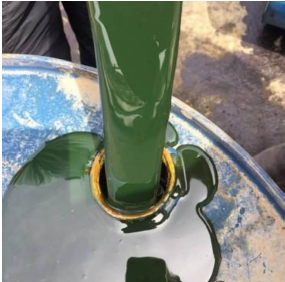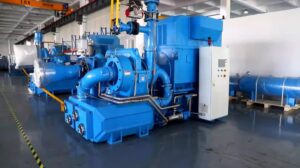Compressor Oil: Essential Lubrication for Optimal Performance
Compressor oil plays a vital role in the operation and longevity of air compressors, ensuring that they run smoothly and efficiently. Without proper lubrication, the internal components of a compressor can experience increased friction, leading to wear and tear, overheating, and ultimately, failure. This makes compressor oil an essential element in maintaining the performance and reliability of your equipment.
In this comprehensive guide, we’ll delve into the importance of compressor oil, the various types available, how to choose the right one for your compressor, and the benefits of regular maintenance. Understanding these aspects will help you make informed decisions that keep your compressor running at its best.
Functions of Compressor Oil
Compressor oil is not just a simple lubricant; it serves multiple critical functions that contribute to the overall performance of the compressor.
Lubrication and Reduction of Friction
The primary function of compressor oil is to lubricate the moving parts within the compressor, such as the pistons, rotors, and bearings. This lubrication reduces friction, which in turn minimizes wear and tear on these components. By reducing friction, compressor oil helps maintain the efficiency of the compressor and extends its operational life.
Cooling and Temperature Regulation
Compressors generate a significant amount of heat during operation, especially in high-pressure systems. Compressor oil helps dissipate this heat, preventing the internal components from overheating. Proper temperature regulation is crucial for maintaining the efficiency and safety of the compressor.
Sealing and Prevention of Leaks
Compressor oil also acts as a sealant, filling the small gaps between moving parts to prevent air or gas from leaking out. This sealing function is particularly important in rotary screw compressors, where the oil helps maintain the pressure and efficiency of the system.
Contaminant Removal and Filtering
As the compressor operates, contaminants such as dust, dirt, and metal particles can enter the system. Compressor oil helps trap these contaminants and keeps them suspended, preventing them from settling on critical components. This contaminant removal is essential for maintaining the cleanliness and efficiency of the compressor.
Types of Compressor Oils

Choosing the right type of compressor oil is crucial for the optimal performance of your equipment. There are several types of compressor oils available, each with its own characteristics and applications.
Mineral-Based Oils
Mineral-based compressor oils are derived from refined petroleum. They are widely used due to their affordability and availability. These oils are suitable for standard operating conditions and are often used in smaller, less demanding compressors.
However, mineral-based oils may not perform as well under extreme temperatures or heavy loads. They also tend to have a shorter lifespan compared to synthetic oils, requiring more frequent changes.
Synthetic Oils
Synthetic compressor oils are engineered to provide superior performance and longevity compared to mineral-based oils. They are designed to withstand extreme temperatures, heavy loads, and harsh operating conditions. Synthetic oils offer better lubrication, reduced friction, and enhanced temperature regulation, making them ideal for high-performance compressors.
While synthetic oils are more expensive than mineral-based oils, their extended lifespan and superior performance often justify the higher cost, especially in industrial and heavy-duty applications.
How Choosing the Right Compressor Oil
Selecting the appropriate compressor oil is essential for ensuring the longevity and efficiency of your equipment. Here are some factors to consider when choosing the right oil:
Compressor Type
Different types of compressors, such as reciprocating, rotary screw, and centrifugal compressors, have varying lubrication requirements. It’s important to choose an oil that is specifically formulated for your type of compressor to ensure optimal performance.
Operating Conditions
The environment in which the compressor operates plays a significant role in determining the right oil. Factors such as temperature, humidity, and the presence of contaminants can affect the performance of the oil. For example, compressors operating in high-temperature environments may require synthetic oils that can withstand extreme heat without breaking down.
Manufacturer Recommendations
Always refer to the compressor manufacturer’s recommendations when selecting oil. The manufacturer will specify the type of oil that is best suited for the equipment, taking into account factors such as the compressor’s design, materials, and operating conditions. Using the recommended oil helps maintain the warranty and ensures the compressor performs as intended.
Benefits of Using High-Quality Compressor Oil
Investing in high-quality compressor oil offers numerous benefits that contribute to the overall efficiency and longevity of your compressor.
Enhanced Compressor Performance
High-quality oils provide superior lubrication, reducing friction and wear on critical components. This leads to smoother operation, less energy consumption, and improved overall performance.
Prolonged Equipment Life
By reducing wear and tear, high-quality compressor oil extends the operational life of the compressor. This reduces the need for frequent repairs or replacements, ultimately saving money and minimizing downtime.
Reduced Maintenance Costs
Using the right oil can significantly reduce maintenance costs. High-quality oils have a longer lifespan, reducing the frequency of oil changes and minimizing the risk of component failure. This translates to lower maintenance expenses and increased reliability.
Impact of Improper Oil Use
Using the wrong type of oil or neglecting regular oil maintenance can have serious consequences for your compressor.
Common Issues with Incorrect Oil Usage
Using the wrong oil can lead to a range of issues, including increased friction, overheating, and component wear. In some cases, the oil may not provide adequate sealing or contaminant removal, leading to reduced efficiency and potential system failures.
Potential Damage to Compressors
Improper oil use can cause significant damage to the compressor, resulting in costly repairs or even complete equipment failure. For example, using a low-quality oil in a high-performance compressor can lead to premature wear, overheating, and reduced efficiency. In severe cases, the compressor may seize, requiring expensive repairs or replacement.
Maintenance Tips for Compressor Oil
Regular maintenance of compressor oil is essential for ensuring the longevity and efficiency of your equipment. Here are some tips for maintaining your compressor oil:
Regular Oil Checks and Replacements
It’s important to regularly check the oil level and condition in your compressor. Low oil levels or degraded oil can lead to increased friction and wear. Replace the oil according to the manufacturer’s recommendations or whenever the oil appears dirty or degraded.
Signs of Oil Degradation
Signs of oil degradation include a change in color, increased viscosity, or the presence of contaminants. If you notice any of these signs, it’s time to replace the oil. Degraded oil can reduce the efficiency of the compressor and increase the risk of component failure.
Proper Storage and Handling of Compressor Oil
Store compressor oil in a cool, dry place away from direct sunlight and contaminants. Always keep the oil container sealed when not in use to prevent contamination. When handling compressor oil, use clean tools and containers to avoid introducing dirt or debris into the system.
Latest Trends in Compressor Oils
The compressor oil industry is continuously evolving, with new trends and innovations emerging to meet the demands of modern compressors.
Eco-Friendly and Biodegradable Oils
As environmental concerns continue to rise, there is a growing demand for eco-friendly and biodegradable compressor oils. These oils are formulated to minimize their impact on the environment while still providing excellent lubrication and performance. They are particularly useful in industries where environmental regulations are stringent.
Technological Advancements in Oil Formulations
Recent advancements in oil technology have led to the development of high-performance oils with enhanced properties. For example, some synthetic oils now offer better thermal stability, oxidation resistance, and longer lifespans, making them ideal for use in demanding applications. These advancements help improve compressor efficiency, reduce maintenance costs, and extend the life of the equipment.
Final Thoughts
Compressor oil is an essential component in maintaining the performance, efficiency, and longevity of air compressors. By understanding the functions of compressor oil, the types available, and how to choose the right one, you can ensure your compressor operates at its best. Regular maintenance, proper oil selection, and staying informed about the latest trends in compressor oils will help you keep your equipment running smoothly for years to come.
Investing in high-quality compressor oil not only enhances performance but also saves you time and money in the long run. Whether you’re using a standard mineral-based oil or a high-performance synthetic oil, the key is to choose the right product for your specific needs and maintain it regularly. With the right approach, you can enjoy the benefits of optimal compressor performance and prolonged equipment life.
FAQs

What is Rubber Process Oil? | Guide to Applications, Benefits, and Selection
What is Rubber Process Oil? | Guide to Applications, Benefits, and Selection Discover More In the sophisticated ecosystem of rubber manufacturing, raw polymers are the canvas, but rubber process oil is the essential medium that brings the masterpiece to life. It is the critical component that transforms rigid, unworkable raw materials into the versatile, durable, and high-performance rubber products that define modern industry and daily convenience. For specialists dedicated to chemical innovation and precision, such as the team at Rumanza Lubricants, the science

Which UAE Lubricants manufacturers is Best for High-Mileage Engines?
Which UAE Lubricants manufacturers is Best for High-Mileage Engines? Discover More The sprawling deserts and bustling metropolises of the United Arab Emirates present a uniquely demanding environment for vehicles, pushing engine lubrication technology to its absolute limits. From the scorching summer heat that can cause conventional oils to thin out and lose protective properties, to the endless stop-start traffic of cities like Dubai and Abu Dhabi that promotes sludge and acidic buildup, our cars endure a severe service regimen unlike

What Vehicles Use Kerasene? A Comprehensive Guide
What Vehicles Use Kerasene? A Comprehensive Guide to Fueling Beyond Gasoline Discover More When we think of vehicle fuel, gasoline and diesel immediately come to mind. They are the lifeblood of our daily commutes, the power behind the trucks that deliver our goods, and the standard by which we measure automotive progress. But venture beyond the everyday, into the realms of high-altitude aviation, rugged agricultural machinery, and groundbreaking space exploration, and you’ll discover a different, equally vital fuel that operates

How To Chose Antioxidant Additives in UAE | Industrial Grade Chemicals?
How To Chose Antioxidant Additives in UAE | Industrial Grade Chemicals? Discover More In the heart of a rapidly industrializing region, the United Arab Emirates stands as a beacon of manufacturing, logistics, and heavy industry. From the sprawling automotive workshops of Dubai to the massive petrochemical complexes in Ruwais, the performance and longevity of machinery are paramount. At the core of this operational excellence lies a critical, yet often overlooked, component: industrial lubricants and fluids. These lifeblood substances are constantly

Viscosity Index Improvers UAE – Improve Lubricant Performance
Viscosity Index Improvers UAE – Improve Lubricant Performance Discover More In the heart of the United Arab Emirates, where ambition is matched only by the scale of its infrastructure, the machinery that builds and powers the nation faces a relentless adversary: the climate. The combination of extreme heat, temperature volatility, abrasive dust, and intense UV radiation creates a perfect storm of conditions that relentlessly attack the lifeblood of all mechanical systems—the lubricant. For maintenance managers, plant operators, and fleet owners,

Compressor Oils UAE | Lubricants for Air Compressors
Compressor Oils UAE | Lubricants for Air Compressors Discover More In the relentless engine of the UAE’s economy, where ambition is matched only by the scale of its construction and industry, air compressors are the indispensable workhorses. They are the silent force driving the pneumatic tools that build our skylines, the automated machinery in our factories, the climate control systems in our buildings, and even the processes in oil and gas refineries. Yet, within these critical machines, a component often

How to Chose Best Diesel Engine Oil in UAE for Your Vehicle | Get Quote
Guide to Choosing the Best Diesel Engine Oil in UAE For Your Vehicle Discover More In the United Arab Emirates, the relationship between a driver and their vehicle is forged in fire. The unrelenting sun, the searing asphalt, and the ever-present fine sand create an operating environment that is among the most punishing on Earth. For the diesel engines that power the UAE’s growth—from the rugged Land Cruisers conquering dunes to the Ford F-150s on city streets and the fleets

What Are the Latest Trends in Sustainable Industrial Oils for UAE Manufacturers?
What Are the Latest Trends in Sustainable Industrial Oils for UAE Manufacturers? Discover More Industrial oils form the lifeline of heavy industries, enabling machines, turbines, compressors, and production lines to function seamlessly. They reduce friction, cool equipment, prevent wear, and ensure uninterrupted operations. In a fast-developing economy like the UAE—where energy, petrochemicals, construction, and manufacturing drive growth—industrial oils are indispensable. But today, the conversation around industrial oils is no longer limited to performance. Global concerns about climate change, carbon emissions,